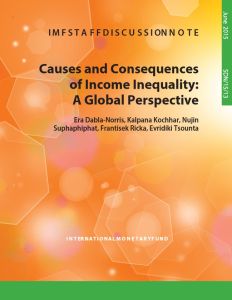Join getAbstract to access the summary!

Join getAbstract to access the summary!
Era Dabla-Norris, Kalpana Kochhar, Nujin Suphaphiphat, Frantisek Ricka and Evridiki Tsounta
Causes and Consequences of Income Inequality
A Global Perspective
IMF, 2015
What's inside?
Income inequality has broad economic implications that many are only beginning to recognize.
Recommendation
Differing income levels can have a positive impact on an economy when people’s desire to move up the financial ladder provides incentives to work and innovate. But when it becomes too pronounced, income inequality can have harmful economic consequences. This breakthrough research from International Monetary Fund economists Era Dabla-Norris, Kalpana Kochhar, Nujin Suphaphiphat, Frantisek Ricka, Evridiki Tsounta extends the scope of past income inequality studies across many more developed and developing countries to offer ideas that can foster growth while narrowing the gap between rich and poor. getAbstract recommends this authoritative work to executives, economists and policy makers.
Summary
About the Authors
Era Dabla-Norris, Kalpana Kochhar, Nujin Suphaphiphat, Frantisek Ricka and Evridiki Tsounta are economists at the International Monetary Fund.

















Comment on this summary